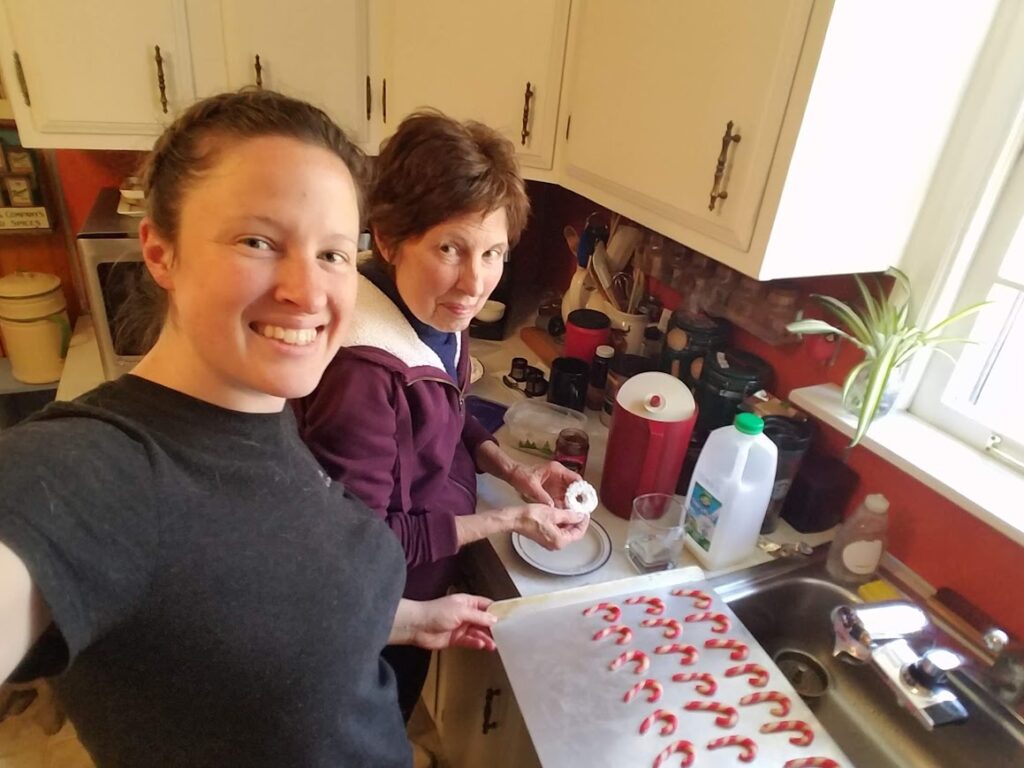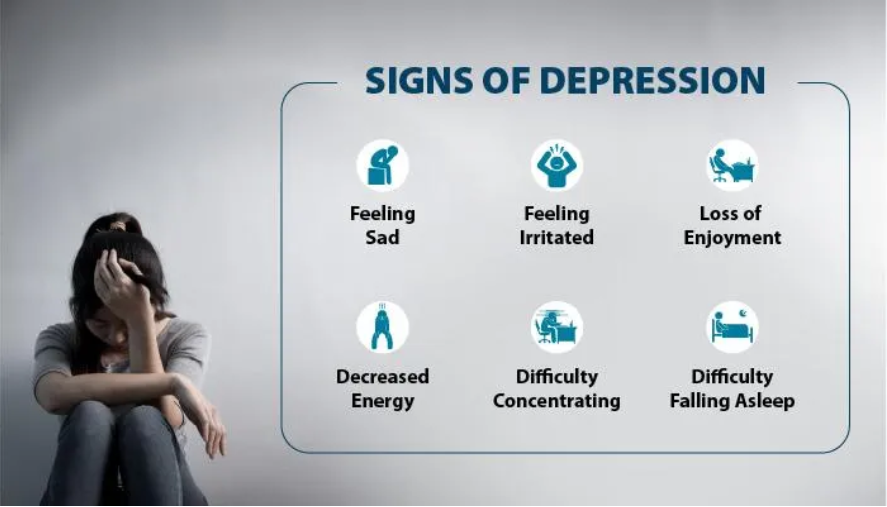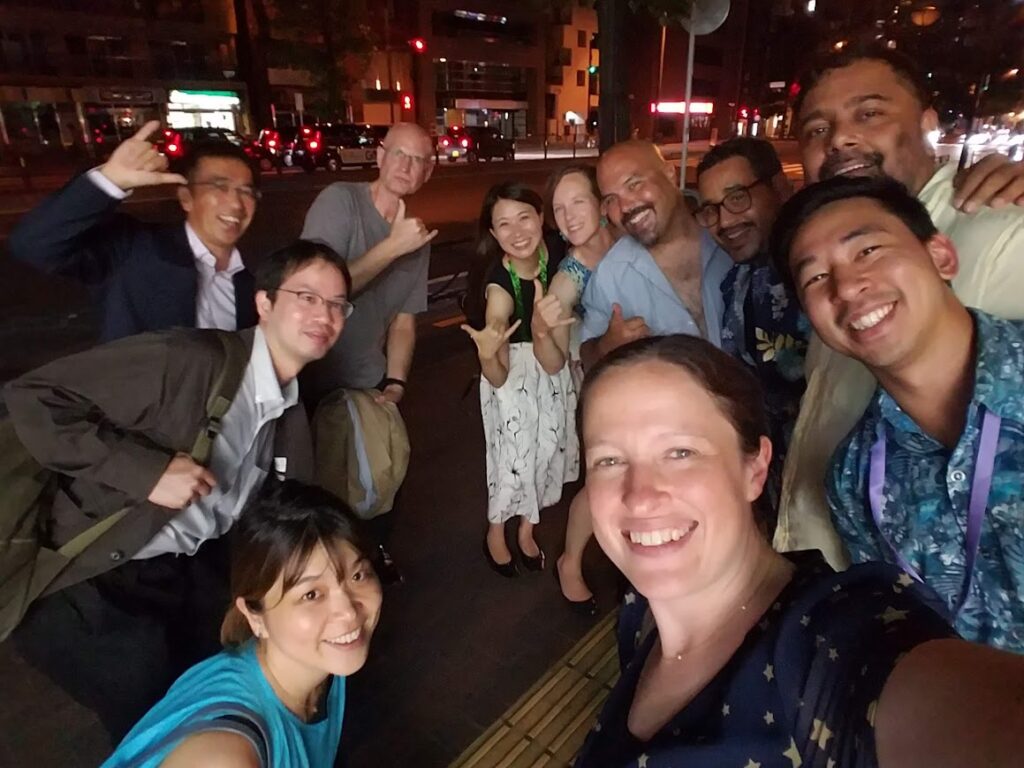I went into 2024 with high hopes about having a productive year, during which I would finally get my shit together and start acting like a responsible adult – and not just be responsible, but have fun while doing it, damnit! It was a noble thought, and I was genuinely looking forward to my master plan of trying seasonal vegan recipes, assembling my successes in a cookbook, and showcasing them at dinners for friends, which would also force me to keep the house clean. [1] And then my life derailed before January was even half over.

2024 was hard in ways I didn’t know were possible. It was hard not having my mom anymore, hard supporting family members who missed her, hard celebrating my birthday and Christmas without her, hard accepting help from others (friends and coworkers), and, for several months in there, hard maintaining a basic level of human functionality. Forget cleaning the house; forget cooking for myself; forget seeing other human beings – these things were fundamentally not possible for me. In last year’s New Year’s post, I said “This year felt especially challenging for me, in what has been a string of challenging years.” Oh, sweet summer child.
I’ve largely accepted the role depression played in my life in 2024, but I still feel some shame for not doing “more,” not being “better.” The house looks worse than it did last January, and for many months if I had enough energy to microwave something from the freezer (non-vegan, non-organic, and encased in plastic), at least I was eating something. It was only this fall when I started to re-emerge from my nest of blankets on the couch and felt like talking to friends again; when I started to embrace the baby steps of doing something that was merely “good enough.” [2]
The Enemy of the Good
With depression recovery ongoing and shame rearing its ugly head, I did not want to think about New Year’s resolutions for 2025. The night before New Year’s Eve, I spent three hours rage-cleaning, [3] ashamed that I hadn’t accomplished more in 2024, that I wasn’t ready for the challenges 2025 would bring, and that I was in no mood to try to make myself “better.” I didn’t want to go into a year that’s going to be objectively harder for many people I know, personally and professionally. I felt neither the motivation nor the capacity to dive back in, put my head down, and push forward; I felt anger at the social construct of obligatory self improvement on January 1, when I already felt like I was doing all I could to hold myself together.
The idea of “doing your best” is a tricky concept for me as a perfectionist. I equate “best” with “perfect”: if it wasn’t perfect, I clearly could have tried harder, put in more time and effort (pulled from something, anything else). I imagine the phrase “do your best” is meant to convey doing what you can, given everything else that’s going on in your life and in recognition of the available time and energy you have, but I still feel like it’s objectively not my best if I haven’t given something my absolute all and sacrificed all other priorities in the process. And if I haven’t given my best, I feel like a failure who is letting down anyone who might be relying on me.

Image credit: [4]
I frequently remind my team at work that we’re in a marathon, not a sprint; I know objectively that we can’t sustain our efforts in the long term if we’re not striking a healthy balance and taking care of ourselves; I also know that, especially as someone in a position of authority, my actions speak louder than my words. For those reasons, I have been trying to cultivate healthier behaviors and perspectives for myself – not because exercising three times a week will make me a better and more responsible person, but because I need healthier coping mechanisms that will support more resilience in times of stress. Because we’re living in increasingly stressful times, and that isn’t going to change just because I want my life to be easier.
What Leadership Looks Like
If I can take better care of myself, that’s great; if I can inspire others to do it too through any position of influence I have, that’s even better. But striking a healthy balance so I can build personal resilience in difficult times is not solely to get through those difficult times on my own: it’s so I can help others who need it too (whether that’s people, animals, the environment, etc.). It was certainly clear how interdependent we are as a society while I was leaning hard on my support network during personal challenges this past year, but I was also reminded of the value of those mutual efforts at a recent professional event.
An organization in our network hosts an annual dinner recognizing community leaders across the country – people who have truly made a difference in the lives of others. It was not surprising that more than one of them extended their recognition to the people in the communities where they work, but it was interesting that one of them said she disliked the idea of recognizing “leaders” in the first place. She explained that such recognition perpetuates the concept that only “leaders” can be doing that kind of work and effectively lets others off the hook from taking action, when the change we’re trying to achieve requires everyone taking part, even in the smallest ways.
That comment reminded me of the leadership discussions I had with my Climate Lab cohort last January, specifically that “leadership” is not confined to some anointed role held indefinitely by a perfect person. Storybook endings give us a sense that there is a “right” person to take the lead, and that as long as they’re in charge, everything will be OK, but we know objectively that that isn’t true in practice (looking at you, US political system). I left my time in Honolulu with the concept of a “leadership moment,” an instant in which someone has the opportunity to fill a need. [5] The simple act of stepping up to take an action (no matter how small or short) when no one else is is true “leadership” at its core, and we’re going to need a lot of that in the year(s) to come.

Moving Forward
That thought leads me back to the present, where I am (we are) looking into a new year with new challenges (some known, some completely unexpected). We are facing myriad problems (social, environmental, you name it), which feel exhausting just to think about. We cannot rely on one “leader” to save us: it is fundamentally impossible for one person to wave a wand and solve all of our problems because the problems we face are complex and ever-evolving. What is required in the absence of one perfect “leader” to help us through tough times is small actions on the part of many to support each other (just as I had some amazing people supporting me last year – thank you). Again, that support relies on a lot of small, imperfect actions by all of us – and whether or not you see yourself as a leader, there are moments when you can do something in a small, short, imperfect way.
Of course, I recognize that it is incredibly hard to do even small, imperfect things without a sense of balance and self care in your own life. And yes, I recognize that it’s usually hardest to create balance and build resilience when you most need it (that’s the point). So I guess I am making New Year’s resolutions after all, though they may not be “resolutions” so much as “intentions.” When I think back on past resolutions, I have so often given up after falling short of perfection (i.e. “oh, I’ve already failed at cleaning the house for an hour every day; no point in trying to continue.”) Instead of working toward something complete and perfect, I’m aiming for something (rather than nothing at all) whenever I can manage it (rather than perfect consistency) in the following ways in 2025:
- Prioritize self care (vitamins, stretching, exercise)
- Let go of that which no longer serves you (physical stuff and negative thoughts)
- Spend time in nature (gardening, camping, walking)
- Spend quality time with Christian and our friends (go out, host dinner)
- Mono-task (intentionally plan activities and be present while doing them)
- Work-related: expand our network and get our work in the hands of people who need it
I hope that this more compassionate path forward for myself, rather than the more traditional brute-force approach to resolutions will support more mental health and resilience on my part – not just for my own well-being but so I can continue my (“capital W”) Work in this world; work that has always been inspired by the imperfect perfectionist who meant so much to me.
Happy New Year to you and thank you for reading.
[1] https://radicalmoderate.online/new-years-resolutions-for-the-burned-out/
[2] https://radicalmoderate.online/good-enough/
[3] https://www.marthastewart.com/what-is-rage-cleaning-8760122
[4] https://www.apollospectra.com/blog/general-health/signs-of-depression
[5] https://radicalmoderate.online/climate-lab-hawaii-insights-continued/
0 Comments